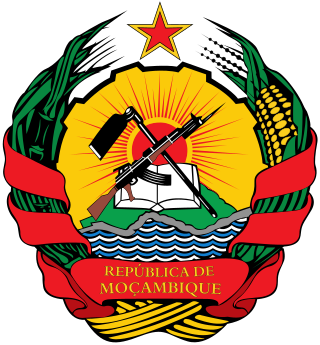
Cuba has had a socialist political system since 1959 based on the "one state – one party" principle. Cuba is constitutionally defined as a Marxist–Leninist state. The present Constitution of Cuba, which was passed in a 2019 referendum, also describes the role of the Communist Party of Cuba to be the "leading force of society and of the state" and as having the capability of setting national policy, and First Secretary of the Communist Party is the most powerful position in Cuba. The 2019 Constitution of Cuba identifies the ideals represented by Cuban independence hero José Martí and revolutionary leader Fidel Castro as the primary foundation of Cuba's political system, while also stressing the importance of the influence of the ideas of Marx, Engels, and Lenin.

Christian Poncelet was a conservative French politician. A member of President Nicolas Sarkozy's Union for a Popular Movement (UMP), he was President of the Senate from 1998 to 2008. In addition to being a Senator, he was Mayor of Remiremont (Vosges) and has been the President of the General Council of Vosges.
Age of candidacy is the minimum age at which a person can legally hold certain elected government offices. In many cases, it also determines the age at which a person may be eligible to stand for an election or be granted ballot access.

Mozambique elects representatives at several levels:

Elections in Cuba are held at municipal, provincial, and national levels. Cuba is a one-party state, with the Communist Party of Cuba being described as the "superior driving force of the society and the state" in the Constitution of Cuba, and all other political parties being illegal. Elections in Cuba are not considered democratic because the government does not allow free and fair voting.

The Republic of Nicaragua elects on the national level a head of state – the president – and a unicameral legislature. The President of Nicaragua and his or her vice-president are elected on one ballot for a five-year term by the people.

Elections in Togo take place within the framework of a presidential system. Both the President and the National Assembly are directly elected by voters. Togo is a one party dominant state with the Union for the Republic in power.

The National Assembly of People's Power is the unicameral parliament of the Republic of Cuba. It is currently composed of 605 representatives who are elected from multi-member electoral districts for a term of five years. The current President of the Assembly is Esteban Lazo Hernández. The Assembly only meets twice a year, with the 31-member Council of State exercising legislative power throughout the rest of the year. The most recent elections were held on 26 March 2023. As of April 2023, the number of representatives is 470.
Parliamentary elections were held in Cuba on 20 January 2008 to elect members of the National Assembly of People's Power. According to the Cuban electoral system, one candidate was nominated for each of the 614 seats in the Assembly, and candidates were elected if they received at least 50% of the vote. The candidates are otherwise proposed by nominating assemblies, which comprise representatives of workers, youth, women, students and farmers as well as members of the Committees for the Defense of the Revolution, after initial mass meetings soliciting a first list of names. The final list of candidates is drawn up by the National Candidature Commission taking into account criteria such as candidates' merit, patriotism, ethical values and revolutionary history.

General elections were held in Zambia on 19 December 1968 to elect the National Assembly and President. The first post-independence polls saw incumbent Kenneth Kaunda retain his post as president, whilst his United National Independence Party, the only party to field candidates in all 105 constituencies, won 81 of the 105 seats in the National Assembly. Voter turnout was 82.5% in the parliamentary election, but 87.1% in the presidential election.

Elections were held on municipal, provincial, republican and federal levels in Yugoslavia from its foundation in 1918 throughout its breakup in 1992.
Indirect parliamentary elections were held in Cuba on 28 December 1981.
Indirect parliamentary elections were held in Cuba on 27 November 1986.
Parliamentary elections were held in Cuba on 24 February 1993 alongside elections to the fourteen Provincial Assemblies. Following the implementation of a new electoral law in 1992, voters now elected the National Assembly directly. Previously voters had elected members of the country's 169 municipal assemblies, who in turn had elected the National Assembly.

Parliamentary elections were held in Cuba on 3 February 2013.

Parliamentary elections were held in Cuba on 11 March 2018 to elect members of the National Assembly of People's Power. Prior to the elections, President Raúl Castro declared he would not be seeking a new term, and a new President of the Council of State will be elected by the National Assembly. His deputy, Miguel Díaz-Canel, was subsequently elected as the new president. However, Castro remained the First Secretary of the Communist Party of Cuba, the most senior position in the country.
Ljiljana Malušić is a politician in Serbia. She has served in the National Assembly of Serbia since 2014 as a member of the Serbian Progressive Party.

Parliamentary elections were held in Cuba on 26 March 2023 to elect members of the National Assembly of People's Power.
Olivera Ognjanović is a politician in Serbia. She has served in the National Assembly of Serbia on an almost continuous basis since 2016 as a member of the Serbian Progressive Party.
Sonja Todorović is a politician in Serbia. She has served in the local government of Temerin and was elected to the National Assembly of Serbia in the 2020 parliamentary election. Todorović is a member of the Serbian Progressive Party.









